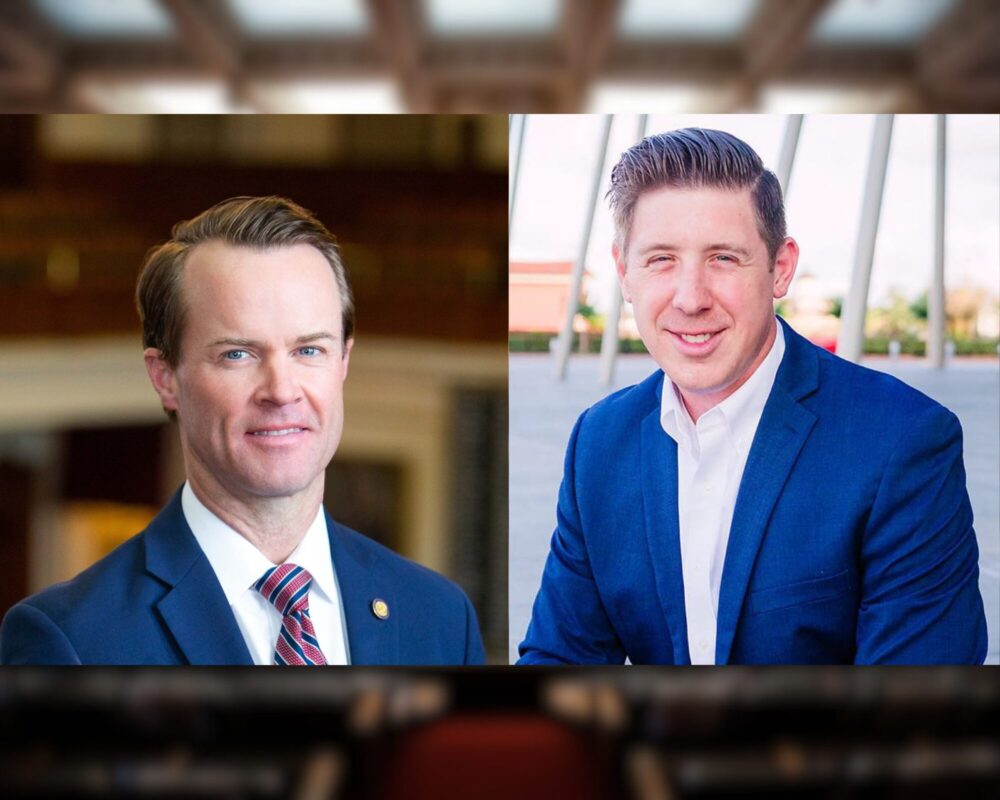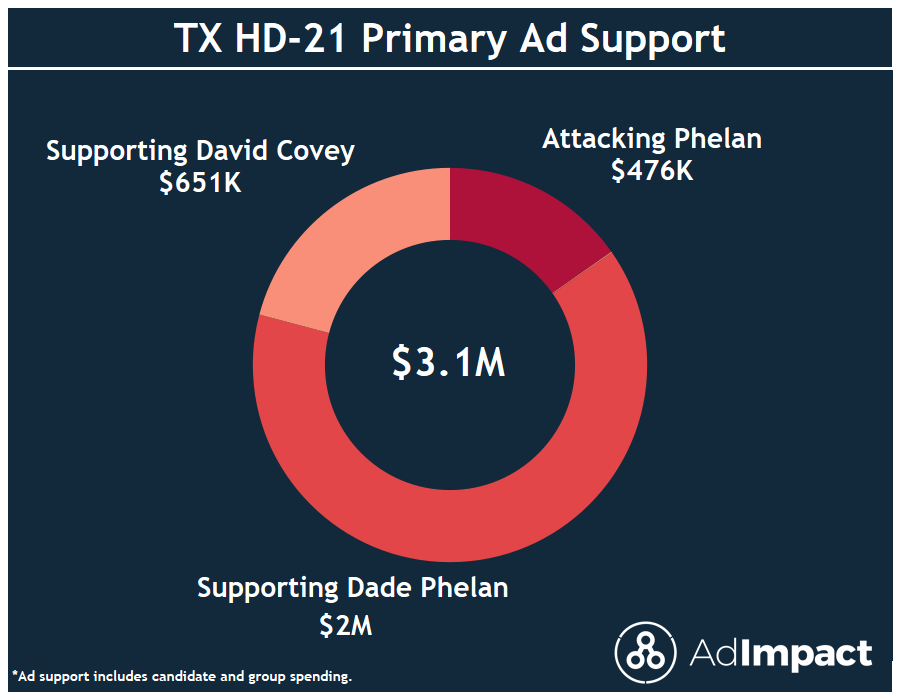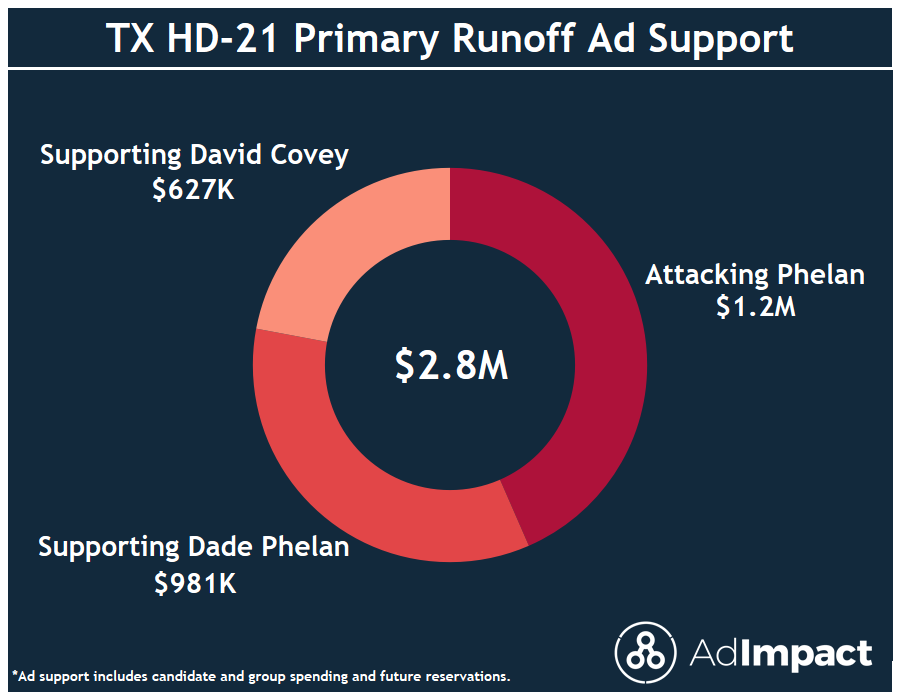
Listen
Early voting in the May 28 Texas primary runoffs ends today. One of the highest-profile contests in the state is the Republican runoff in House District 21 between Texas Speaker of the House Dade Phelan and former Orange County GOP chairman David Covey. The race could prove the most expensive state legislative contest in Texas history.
Monday night, former Governor Rick Perry introduced Speaker Phelan to a capacity crowd at Courville’s, a Cajun restaurant and catering venue just off US-90 in Beaumont. One of the first things Phelan did as he took the stage was to apologize to his family.
“I apologize for your mailboxes,” Phelan said. “I apologize for what you’ve seen on TV. The lies, the lies, the lies are unimaginable. We’ve never seen anything like it in the history of Southeast Texas.”

Phelan was referring to the political attack ads directed at him. He’s running for his sixth term in the Texas House and claimed the money spent on House District 21 is breaking state records. It’s certainly having an outsized impact in the district, a three-county region along the Louisiana border that’s also known as “the Golden Triangle.”
“I’ll remind you, when you buy $100,000 in TV in Beaumont, it’s like buying $500,000 in Houston,” he said.
And the money is not just going into TV commercials. It’s paying for social media campaigns and mailers, including one with a doctored photo showing Phelan hugging the former U.S. Speaker of the House, and Democrat, Nancy Pelosi. Phelan said much of the money comes from a handful of very wealthy individuals supporting his opponent, David Covey, who has never run for state office before.
“Here we are in a runoff,” Phelan said, “because he has taken money from two West Texas billionaires, and now some guy from Pennsylvania, who I’ve never heard of until the last six weeks, who just came in and spent millions of dollars against me.”
Covey’s Donors
Phelan didn’t name them, but he was talking specifically about two conservative oil executives from the Midland area, Tim Dunn and Farris Wilks, along with Pennsylvania tech investor Jeff Yass. All three have been pouring millions of dollars into efforts to defeat politicians who have opposed school choice.
Yass is one of the largest contributors to the Club for Growth, a conservative 501(c)(4) nonprofit based in Washington, D.C. The Club for Growth has spent nearly $1.8 million on advertising to defeat Phelan who’s been accused of blocking school vouchers. The organization also blames the House Speaker for giving away power to Democrats.
“Basically, we don’t feel you can call yourself a conservative if you oppose school freedom,” said David McIntosh, the president of the Club for Growth and a former Indiana congressman. “I think it’s an important symbolic victory if Mr. Covey wins, and the reason would be, it basically sends a signal to other Republicans: You don’t want to try to get power in this fashion.”
This fashion, meaning by giving some House committee chairs to Democrats. It’s a traditional power-sharing arrangement in the Texas Legislature that’s fallen sharply out of favor with conservative Republicans. Many blame the process for preventing the passage of school choice, among other priorities.
According to campaign finance reports filed with the Texas Ethics Commission, since July of last year, oil executive Tim Dunn has donated just over $8.6 million to a pair of political action committees, Defend Texas Liberty and Texans United for a Conservative Majority, either directly or through an entity known as Hexagon Partners. Oil executive Farris Wilks donated about $2.8 million over the same period.
Tim Dunn and Farris Wilks provided virtually all the donations to Defend Texas Liberty and Texans United for a Conservative Majority over the current cycle. Those two PACs in turn donated $800,000 to David Covey’s campaign. Covey received another $700,000 directly in donations from a third Texas billionaire, insurance broker Alex Fairly of Amarillo. Neither Dunn, Wilks, nor Fairly responded to requests for interviews. For context, Covey’s campaign has raised just over $2.5 million since July of last year, and more than three out of every five dollars came from three men.
“Texas has no campaign finance limits whatsoever,” said Anthony Gutierrez, executive director of Common Cause Texas. “So, if you’re a billionaire, and you want to throw millions of dollars into the political system to change who’s in office, you can do that.”
Gutierrez, who studies campaign finance, is convinced that the Phelan-Covey race could easily be the most expensive race for a State House district in Texas history, though he said no one will know for certain until the Texas Ethics Commission publishes the final campaign finance reports of the cycle in July.
Asked about the potential influence of these three men, David Covey told Houston Public Media, “Dade Phelan has raised more money from out-of-state donors than the total amount of money I have raised. The amount of money Phelan received from outside of the district is greater than 5 times the amount of money I raised.”
Phelan’s Contributors
Covey’s claim isn’t without merit, and it speaks to an important point about the influence of money in a region like the Golden Triangle.
“Generally, money is probably the most important factor in any political campaign,” said political consultant Bill Miller, whose firm, Austin-based HillCo Partners, has donated to Phelan’s campaign. “I think there’s so much money that’s been raised, and is being raised, that money is irrelevant. And there’s very few races where you can say that. But this race — because it’s a small area, and there’s so much money — I don’t think that either side will want for money to do whatever it is that they believe will help them win the race.”
Campaign finance records show Phelan has raised more than $9.4 million this cycle. The largest individual donor to Phelan by far is Miriam Adelson, widow of Sheldon Adelson and owner of the Las Vegas Sands Corporation. Adelson’s company is one of the main forces pushing to legalize casino gambling in Texas.
Adelson donated more than $13 million to a pair of political action committees, Texas Defense and Texas Sands. Those two PACS in turn donated more than $800,000 to Phelan. Adelson also donated another $100,000 to Phelan’s campaign directly. Altogether, she’s supplied 1 dollar out of every 10 Phelan has collected. More than half of that money came in the critical two months following Phelan’s second-place finish in the first round of primary voting.
Phelan’s next biggest contributor is the Associated Republicans of Texas Campaign Fund. The fund’s parent body, the Associated Republicans of Texas, bills itself as a non-profit dedicated to maintaining a Republican majority in the Texas Legislature. The group has raised $7.5 million since last July. One of its biggest benefactors is Houston-based John L. Nau III, the chairman and CEO of Silver Eagle Beverages, one of the nation’s largest Anheuser-Busch distributors. Nau, who co-chairs the Associated Republicans’ board of directors, gave the organization $2.1 million over the past ten months.
Phelan has received just over $238,000 from the Associated Republicans of Texas Campaign Fund. That’s only 3% of the group’s total fundraising over the current cycle, but virtually all of it followed Phelan’s second-place finish to Covey in the first round of primary voting in March, making it a crucial lifeline.
What comes next?
It’s far from normal to see so many millions of dollars in campaign donations flowing through this district. The last time Phelan fought a competitive race was his first legislative contest back in 2014. In that cycle, he raised just 2% of what he raised for this primary. So, I asked Phelan whether it’s time for tougher state campaign finance rules.
“It’s less of a finance issue than some of the campaign graphics and some of the images and some of the voiceovers that are obviously not realistic,” Phelan said. “They’re not accurate. And they’re obviously deep fakes. And AI, as it gets more and more refined, is very problematic in campaigns. We saw it in my campaign. We’re seeing it in other campaigns across the state of Texas. It’s a misdemeanor right now, and I don’t think that’s strong enough at all.”
Whether any such legislation comes to pass hangs on the outcome of this race: if Phelan loses, campaign finance limits will fall on whoever succeeds him as Speaker of the House.
Regarding the broader question of campaign finance regulation, Phelan is more philosophical, as someone who’s in the lead when it comes to fundraising can afford to be.
“It’s a First Amendment right to spend your money,” he said. “I get it. And I don’t know how the state of Texas will address that and still be under the constitutional standards that we expect from free speech.”

